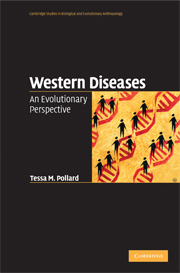Book contents
- Frontmatter
- Contents
- Preface
- 1 Introduction
- 2 An evolutionary history of human disease
- 3 Obesity, type 2 diabetes and cardiovascular disease
- 4 The thrifty genotype versus thrifty phenotype debate: efforts to explain between population variation in rates of type 2 diabetes and cardiovascular disease
- 5 Reproductive cancers
- 6 Reproductive function, breastfeeding and the menopause
- 7 Asthma and allergic disease
- 8 Depression and stress
- 9 Conclusion
- References
- Index
5 - Reproductive cancers
Published online by Cambridge University Press: 05 June 2012
- Frontmatter
- Contents
- Preface
- 1 Introduction
- 2 An evolutionary history of human disease
- 3 Obesity, type 2 diabetes and cardiovascular disease
- 4 The thrifty genotype versus thrifty phenotype debate: efforts to explain between population variation in rates of type 2 diabetes and cardiovascular disease
- 5 Reproductive cancers
- 6 Reproductive function, breastfeeding and the menopause
- 7 Asthma and allergic disease
- 8 Depression and stress
- 9 Conclusion
- References
- Index
Summary
Breast cancer is one of the biggest causes of mortality in western societies. Other reproductive cancers are less well known but also common, including endometrial and ovarian cancers in women and prostate cancer in men. They are often cited as examples of ‘western’ cancers, since levels are much higher in affluent western populations than elsewhere. As with most other cancers, and non-communicable diseases in general (see Chapter 2), increased lifespan is one obvious explanation of high rates of these diseases in affluent western populations, but increased lifespan cannot explain all of the association between westernisation and reproductive cancers. So, why does an affluent western lifestyle bring an increased risk of reproductive cancers?
In this chapter I draw on the work of biological anthropologists and epidemiologists to answer this question. After summarising geographical and temporal trends in the incidence of reproductive cancers, I describe the main known risk factors for these diseases. I then go on to show that the affluent western lifestyle has increased exposure to all of these risk factors, focusing in particular on the evidence linking western life to increased exposure to endogenous gonadal hormones: oestrogen and progesterone secreted by the ovaries in women, and androgens secreted by the testes in men. Here I draw particularly on the pioneering work of Ellison (Ellison 1999).
What are reproductive cancers?
Cancerous tumours, including those of the reproductive system, result from the unregulated division of undifferentiated cells.
- Type
- Chapter
- Information
- Western DiseasesAn Evolutionary Perspective, pp. 75 - 98Publisher: Cambridge University PressPrint publication year: 2008

